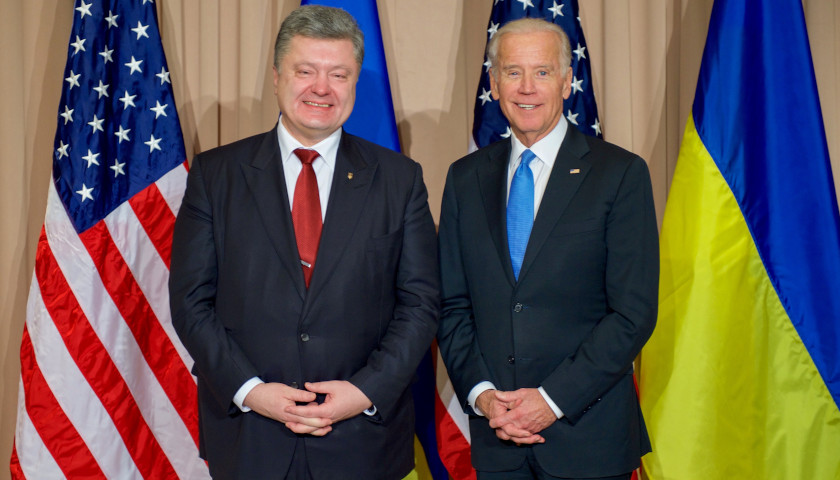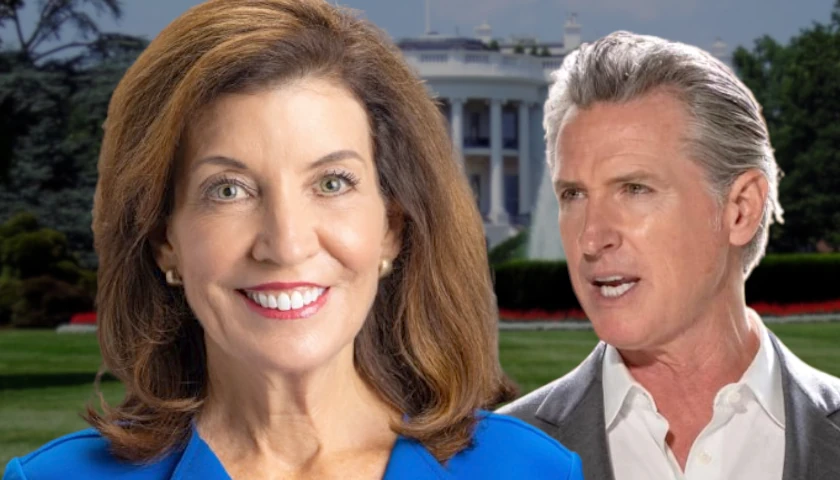by Debra Heine
In November of 2016, then-Vice President Joe Biden belittled and sought to undermine the incoming Trump administration, a recently leaked phone call between Biden and former Ukrainian President Petro Poroshenko reveals.
In the call, which was brought to light by Ukrainian politician Andriy Derkach, the outgoing veep told Poroshenko that he had withheld certain information regarding Ukraine from the Trump transition team because they lacked foreign policy experience. Biden also promised to stay “deeply engaged” in Ukraine policy even after he left office.
Biden famously threatened Poroshenko in March 2016, telling him that the Obama administration would pull $1 billion in U.S. loan guarantees if he didn’t immediately fire Prosecutor General Viktor Shokin, who was investigating corruption at Burisma Holdings, a natural gas company that employed his son Hunter Biden.
Last May, Ukraine President Volodymyr Zelensky called for an investigation after audio recordings from that telephone conversation leaked.
Shokin described how Poroshenko had pressured him to tank the Burisma investigation in a a sworn affidavit prepared for a European court.
“On several occasions President Poroshenko asked me to have a look at the case against Burisma and consider the possibility of winding down the investigative actions in respect of this company but I refused to close this investigation,” Shokin testified. “The truth is that I was forced out because I was leading a wide-ranging corruption probe into Burisma Holdings, a natural gas firm active in Ukraine and Joe Biden’s son, Hunter Biden, was a member of the Board of Directors.”
In the November 16, 2016 phone call, Biden told Poroshenko that Trump’s team was not up to speed and unprepared for the transition: “The truth of the matter is that the incoming administration doesn’t know a great deal about the situation,” he said.
Biden also asked the then-president of Ukraine what he said in his phone call with the newly elected Trump, saying that his potential trip to Ukraine in December depended on the answer.
“With regard to my coming on the 21st, as I told you I can never come … the 21st. I am going to try to come immediately after, in early December. But here’s where I am now, part of my answer to that depends on what was your conversation with our president-elect?” Biden said.
The former vice president then began disparaging the incoming Trump team in earnest, saying that they did not think they were going to win the election and because of this, the incoming administration was not up to the job.
“One of the things I’ve been doing is spending — they are not making the — I’m not being critical, but they, the new administration, the incoming administration has been very, very slow on getting ready for transition,” Biden said. “Quite frankly, like most of America, they didn’t think they were going to win the election, so they did not have a fulsome transition team. As a matter of fact, they changed their transition team. Transition is a very, very delicate and precise dance, it goes on from administration to administration over the last 100 years and it requires the exchange of classified information and the like,” he continued.
Biden went on to divulge that he had withheld some information regarding Ukraine from members of the Trump transition team.
“And the people they put forward to be part of the transition have to be cleared to do that, just as we had to be cleared after the Bush administration, etc. They have not done that, they’re trying to catch up and do it now since they fired the guy who headed up the transition just last week. The reason I bother to tell you that is I have been somewhat limited on what I am able to tell their team about Ukraine,” he explained.
In November of 2016, Trump fired two very questionable individuals who had been handling national security for the transition, former Rep. Mike Rogers of Michigan and lobbyist Matthew Freedman. The “purge” was reportedly orchestrated by Jared Kushner, Trump’s son-in-law and close adviser.
“The truth of the matter is that the incoming administration doesn’t know a great deal about the situation. So I am meeting with the vice president-elect, who is the only one who has any foreign policy experience,” he added, referring to Vice President Mike Pence.
At the time, it should be noted, the FBI was conducting a counterintelligence investigation into the Trump campaign’s contacts with Russia based the Democrat-funded opposition research gathered by the anti-Trump former British spy Christopher Steele.
Poroshenko said that Biden played “an enormous role in bringing peace to my country, and actually save my country,” and Biden thanked him for his kind words. He went on to divulge his plans to remain involved in U.S-Ukrainian policy even after leaving office.
“Well, you’re awfully generous,” Biden said, adding, “I don’t plan on going away. As a private citizen, I plan on staying deeply engaged in the endeavor that you have begun and we have begun.”
The former VP then expressed concern that the incoming administration might question his motives if he set up a foreign policy backchannel for himself after he left office as a private citizen.
“I’m worried that they don’t know enough, they will think I’m trying to game them,” Biden explained. “They will think I am trying to put them in a corner. They will question my motives in going before they are fully briefed. And I’m sure you understand that, you’re a good negotiator,” he added.
In a post at the Federalist Thursday, Alex Plitsas, a national security expert and U.S. Army combat veteran of the Iraq War, called Biden’s offer to set up a backchannel with Ukraine after he left office a potential Logan Act violation, an ironic twist since it was Biden himself who suggested using the rarely used law against National Security Advisor Michael Flynn as a pretext to pursue criminal charges against him.
The Logan Act bars private citizens from engaging in U.S. foreign policy, although its constitutionality remains questionable and no person has ever been convicted of violating it since it was signed into law in 1799. Ironically, this is the same act that, at Joe Biden’s suggestion, the FBI accused National Security Advisor Michael Flynn of violating as a result of a discussion Flynn had with the Russian ambassador to the United States around nearly the same time as Biden’s call with Poroshenko.
If Russian intelligence had actually penetrated the incoming Trump administration, Biden’s comments would have almost certainly tipped them off that something was amiss, placing our national security in grave danger.
Additionally, it is mind-boggling that the vice president felt comfortable telling a foreign leader that there were things he was unable to tell the incoming administration at the same time the Department of Justice and the FBI failed to notify President-elect Trump of potential counterintelligence risks (that ended up not being true) posed by members of his campaign team who might join his administration in official capacities.
Robert Gates, who served as defense secretary for the Obama administration, said in his memoir that Biden has “been wrong on nearly every major foreign policy and national security issue over the past four decades.” Despite Biden’s established record of failure on foreign policy, Obama selected him to be the “point man” on Ukraine, Iraq, Afghanistan and China due to his 30 years on the Senate Foreign Relations Committee.
As the hapless Biden campaigns to be the nation’s next commander-in-chief, we continue to see the fallout from Obama’s unfortunate choice.
– – –
Debra Heine reports for American Greatness.





